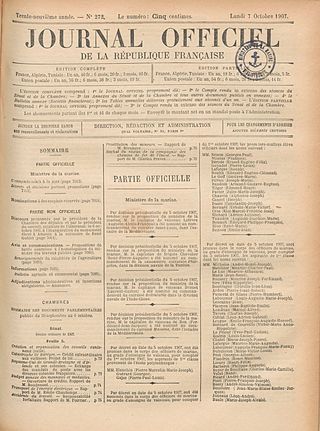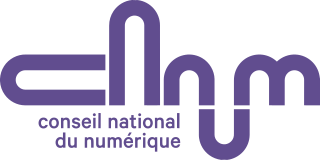Related Research Articles

Eure is a department in Normandy in Northwestern France, named after the river Eure. Its prefecture is Évreux. In 2021, Eure had a population of 598,934.

Oise is a department in the north of France. It is named after the river Oise. Inhabitants of the department are called Oisiens or Isariens, after the Latin name for the river, Isara. It had a population of 829,419 in 2019.

The Official Journal of the French Republic, also known as the JORF or JO, is the government gazette of the French Republic. It publishes the major legal official information from the national Government of France, the French Parliament and the French Constitutional Council.

Éric Besson is a French politician and businessman. From 2009 to 2010, he was the Minister of Immigration, Integration, National Identity and Co-Development in the government of François Fillon.

Laàs is a commune in the Pyrénées-Atlantiques department in south-western France.

France Travail, previously Pôle emploi, is a French governmental agency which registers unemployed people, helps them find jobs and provides them with financial aid. The agency was created in 2008, resulting from the merger between the ANPE and the ASSEDIC. The agency employs 45,000 civil servants. The merger had been expected for a very long time, for the two agencies had been created more than forty years before.

Henri Verdier is a French entrepreneur and digital specialist who has been serving as the country's ambassador for digital affairs since 2018. Previousy he was the French State Chief Technology Officer (CTO) from 2015 to 2018 and, before, the Head of Etalab, the French Agency for Public Open data.

Gilles Babinet is a French multi-entrepreneur.

The Conseil national du numérique is a French independent advisory commission created on 29 April 2011 by the French presidential decree n°2011-476. It was reorganized and expanded by another French presidential decree on 13 December 2012, to expand its spectrum of actions to all the questions set up by the development of the digital in society and economy. The council issues independent opinions and recommendations on any question relating to the impact of digital technologies on economy and society. The government can consult the council on new legislation or draft regulations.

The Agence nationale de la sécurité des systèmes d'information is a French service created on 7 July 2009 with responsibility for computer security.
Online access to legal information was implemented in France in 1999 and complemented in 2002. In that regard, France has been at the forefront of Open Data in Europe.

Renaissance (RE) is a liberal and centrist political party in France. The party was originally known as En Marche ! and later La République En Marche ! before adopting its current name in September 2022.

Paula Forteza is a French politician who was elected to the National Assembly of France in the 2017 French legislative election as a member of La République En Marche!. She represents the Second constituency for French residents overseas. Head of Cédric Villani list in the 19th arrondissement of Paris for the 2020 French municipal elections, she left LREM during the campaign.

Danièle Obono is a far-left Gabonese-French politician who has represented the 17th constituency of Paris in the National Assembly since 2017. A member of La France Insoumise (FI), she was reelected in the first round of the 2022 legislative election.

Stéphanie Do is a French politician and a member of La République En Marche!. She was elected to the French National Assembly on 18 June 2017, representing the 10th constituency of department of Seine-et-Marne, under the investiture of La République En Marche. Do holds a position in the Bureau of the National Assembly of the 15th legislature of the French Fifth Republic as a secretary.

The presidency of François Hollande began on 15 May 2012 when the Constitutional Council announced the official results from the presidential election during his inauguration and ended on 14 May 2017 when Emmanuel Macron was officially inaugurated as the 25th President of France. Hollande, a leader of the Socialist Party, worked alongside Prime Minister Jean-Marc Ayrault until 2014 then Manuel Valls until 2016 and finally Bernard Cazeneuve until the inauguration of Macron in 2017.

The loi pour une République numérique is a French law first proposed by Axelle Lemaire, Secretary of State for Digital Affairs, voted on 7 October 2016.

Ilana Cicurel is a French lawyer and politician of La République En Marche! (LREM) who has been serving as a Member of the European Parliament since 2020.

Salwa Toko is a diversity and digital literacy activist. She is President of the Conseil National du Numérique (CNNum).

Thomas Cazenave is a French civil servant and politician of the Renaissance party who has been serving as Minister in charge of Public Accounts in the government of successive Prime Ministers Élisabeth Borne and Gabriel Attal since 2023.
References
- 1 2 "Find your ROME code: jobs, jobs, skills and knowledge". Digits.solutions. Retrieved 1 September 2023.
- 1 2 "The Operational Directory of Professions and Jobs (ROME)". neobrain.io. Retrieved 31 August 2023.
- ↑ LOI n° 2016-1321 du 7 octobre 2016 pour une République numérique (in French). 7 October 2016. Retrieved 17 May 2017.
- ↑ Décret n° 2017-331 du 14 mars 2017 relatif au service public de mise à disposition des données de référence (in French). 14 March 2017. Retrieved 17 May 2017.
- ↑ "Service Public de la Donnée - Data.gouv.fr". www.data.gouv.fr (in French). Retrieved 17 May 2017.
- ↑ "Avec le Rome 4.0, Pôle emploi veut créer un langage compétences partagé". Centre Inffo (in French). 25 January 2023. Retrieved 3 September 2023.
- ↑ "Accueil Pôle emploi | Pôle emploi". www.pole-emploi.fr. Retrieved 31 August 2023.